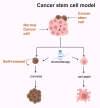Molecular mechanisms and therapeutic strategies in overcoming chemotherapy resistance in cancer
- PMID: 39757310
- PMCID: PMC11700966
- DOI: 10.1186/s43556-024-00239-2
Molecular mechanisms and therapeutic strategies in overcoming chemotherapy resistance in cancer
Abstract
Cancer remains a leading cause of mortality globally and a major health burden, with chemotherapy often serving as the primary therapeutic option for patients with advanced-stage disease, partially compensating for the limitations of non-curative treatments. However, the emergence of chemotherapy resistance significantly limits its efficacy, posing a major clinical challenge. Moreover, heterogeneity of resistance mechanisms across cancer types complicates the development of universally effective diagnostic and therapeutic approaches. Understanding the molecular mechanisms of chemoresistance and identifying strategies to overcome it are current research focal points. This review provides a comprehensive analysis of the key molecular mechanisms underlying chemotherapy resistance, including drug efflux, enhanced DNA damage repair (DDR), apoptosis evasion, epigenetic modifications, altered intracellular drug metabolism, and the role of cancer stem cells (CSCs). We also examine specific causes of resistance in major cancer types and highlight various molecular targets involved in resistance. Finally, we discuss current strategies aiming at overcoming chemotherapy resistance, such as combination therapies, targeted treatments, and novel drug delivery systems, while proposing future directions for research in this evolving field. By addressing these molecular barriers, this review lays a foundation for the development of more effective cancer therapies aimed at mitigating chemotherapy resistance.
Keywords: Apoptosis evasion; Cancer stem cells; Chemotherapy resistance; Epigenetic modifications; Molecular mechanisms; Targeted therapy.
© 2025. The Author(s).
Conflict of interest statement
Declarations. Ethics approval and consent to participate: Not applicable. Consent for publication: Not applicable. Competing interests: The authors declare no conflict of interest.
Figures





References
-
- Sung H, Ferlay J, Siegel RL, Laversanne M, Soerjomataram I, Jemal A, et al. Global Cancer Statistics 2020: GLOBOCAN Estimates of Incidence and Mortality Worldwide for 36 Cancers in 185 Countries. CA Cancer J Clin. 2021;71(3):209–49. 10.3322/caac.21660. - PubMed
-
- Bray F, Laversanne M, Weiderpass E, Soerjomataram I. The ever-increasing importance of cancer as a leading cause of premature death worldwide. Cancer. 2021;127(16):3029–30. 10.1002/cncr.33587. - PubMed
-
- Krell RW, Wei AC. Gallbladder cancer: surgical management. Chin Clin Oncol. 2019;8(4):36. 10.21037/cco.2019.06.06. - PubMed
-
- Hickman L, Contreras C. Gallbladder Cancer: Diagnosis, Surgical Management, and Adjuvant Therapies. Surg Clin North Am. 2019;99(2):337–55. 10.1016/j.suc.2018.12.008. - PubMed
-
- Vogel A, Bridgewater J, Edeline J, Kelley RK, Klümpen HJ, Malka D, et al. Biliary tract cancer: ESMO Clinical Practice Guideline for diagnosis, treatment and follow-up. Ann Oncol. 2023;34(2):127–40. 10.1016/j.annonc.2022.10.506. - PubMed
Publication types
MeSH terms
Substances
LinkOut - more resources
Full Text Sources
Medical
